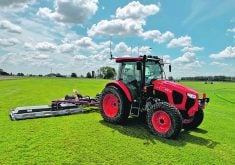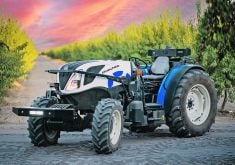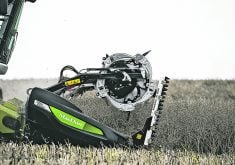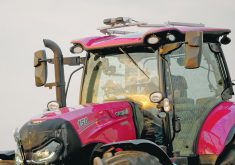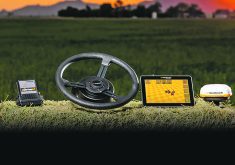Company puts money into Monarch Tractor and Sabanto, both either building or equipping autonomous implements
Trimble Ventures has made investments over the last year into two start-ups that specialize in autonomous farming equipment.
Last fall it invested in Monarch Tractor, an American company that builds autonomous electric compact tractors, and it recently invested in Sabanto.
Sabanto equips tractors with autonomous technology to perform in-field operations. The company built a fleet of 60 to 90 horsepower tractors, and it has autonomously tilled, planted, seeded, weeded and mowed fields through the United States Midwest.
Phil Sawarynski, managing director of Trimble Ventures, the corporate venture capital fund of Trimble Inc., said the investment into Monarch and Sabanto supports Trimble Ventures’ mission, which is to invest in early and growth-stage companies that are accelerating innovation and digital transformation in the industries Trimble serves.
Read Also

Europe holds promise for Canadian lentils
Pulse Canada is trying to help boost lentil consumption in Europe, which is already the fourth largest market.
“We look at construction (companies) both vertical and horizontal. We are in agriculture, we have a geospatial group, which is again both vertical and horizontal. We have an autonomy group, a transportation group and so we look for Investments that are relevant in the industries that we’re in,” Sawarynski said.
He said Trimble’s agriculture group focuses on original equipment manufacturer relationships and also has a large aftermarket business.
“We tend to be the technology provider that’s brand agnostic, and so our gear is in Deere tractors, CNH vehicles, you name it. And so, when I think about Sabanto, what’s really interesting about them is that they’re taking a similar approach from an autonomy standpoint,” Sawarynski said.
“They can put their systems in any sort of tractor.”
Trimble has built autonomous products for more than a decade, including driver assist technology in farm equipment.
Trimble’s positioning and steering systems are typically in larger farm machines, while Sabanto typically works with smaller tractors.
Sawarynski said there is potential for both companies to work together to build powerful autonomous systems, especially considering they both work in broad-acre production.
He said Sabanto’s farming-as-a-service business model is also interesting, even though it’s very different from how today’s farms operate.
Sabanto’s planting and tillage service to farmers is similar to how custom combine businesses follow harvest conditions around the Midwest.
“This obviously lowers the capital outlay from the beginning. So hopefully, it opens avenues to new people that want to get into farming,” Sawarynski said.
“We understand each other and I think there’s a lot of things that we can do with each other, and with potentially more partnerships in the future, to accelerate technology and accelerate what the next generation of farming looks like.”
Sabanto’s Series A funding round, which Trimble Ventures participated in, raised US$17 million. Investments in the funding round were led by ag-tech venture firm Fulcrum Global Capital.
John Peryam, co-founder and partner at Fulcrum, joined Sabanto’s board of directors.
Monarch Tractor recently announced it plans to ramp up production of its autonomous electric tractor, and tens of thousands of units per year will soon roll out of the Foxconn plant in Lordstown, Ohio.




